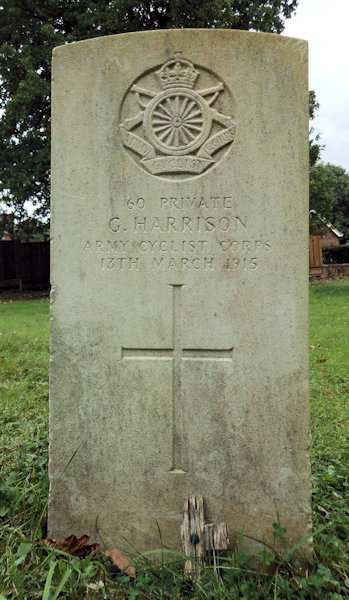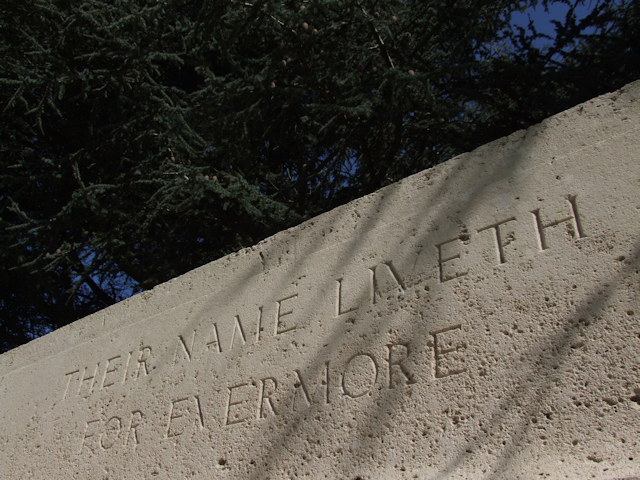Name
George Harrison
1889
Conflict
First World War
Date of Death / Age
13/03/1915
Rank, Service Number & Service Details
Private
60
Army Cyclist Corps
North Midland Div. Cyclists' Coy.
Awards: Service Medals/Honour Awards
Searched but not found
Cemetery/Memorial: Name/Reference/Country
BISHOP'S STORTFORD OLD CEMETERY
E. 2. 43.
United Kingdom
Headstone Inscription
None
UK & Other Memorials
Not on the Bishop's Stortford memorials
Pre War
George Henry W Harrison was born in 1888 in Nottingham. He married Marie A (Marion Annie) Lulham in late 1910. They had three children, Annie Kathleen, Percy Henry and Harold. He lived at 176 Sherwood Street, Nottingham on enlistment.
Wartime Service
He enlisted in January 1915 at Nottingham and served 51 days. He died at Bishop's Stortford of accidental death from asphyxia following a drinking session.
The Nottingham Evening News of 16th March 1915 reported the following inquest into his death:
“Nottm. Territorial Asphyxiated in his Billet - “A SUB-LIEUTENANT’S SUPPER
Private George Harrison [1], a Nottingham Territorial of the Sherwood Foresters attached to the North Midland Divisional Cyclists’ Corps, whose home is in Sherwood Street North, Nottingham, has met with a sad death at Bishop’s Stortford, where he was quartered.
Second Lieutenant Albert Ball stated at the inquest that he had known the deceased from the time he joined as a recruit two months ago. He was on parade on Saturday from nine a.m. to three p.m., and witness saw him next at 7.30 p.m. at the Railway Hotel, where he gave a supper. The deceased arrived an hour late and appeared excited. Witness thought he had had some drink but not that he was drunk. Deceased made a good supper, and had three whiskies and soda, and two glasses of ale. He did not help himself but witness, who was a teetotaller, poured the “nips” out for him. He appeared all right when they broke up just before nine o’clock, but on getting into the open air he was affected. Witness thought he was too drunk to walk, so sent two men home with him. Witness had never seen him drunk before. If he had thought he was drunk at supper he would have sent him home then.
In reply to Superintendent E. T. Foster, Second Lieutenant Ball said supper was provided by him. The drink consumed was a bottle and a half of whisky, four or five glasses of ale, and a small bottle of champagne. There were seven at the supper. Deceased had no champagne.
Corporal William Parkinson said he and deceased went into the town of Bishop’s Stortford at 5 p.m. on Saturday to have a shave. They had a walk and three drinks of ale each and separated at 6 p.m. Witness saw him next at the supper when he was very talkative, which was not unusual. Witness did not remember much afterwards, as “he was in the same boat”. Witness drank the bottle of champagne, three “goes” of whisky, and two glasses of beer. Witness went home first and fell down in his billet. He believed deceased in private life was a coal carter.
Private Frank Robert Hubbard said he was at the supper and saw deceased arrive at 7.30. He was slightly excited, and had had some drink, but he was not drunk. A very little would upset him. Witness assisted him to his billet, as he was unable to stand, and placed him on two palliasses on the floor. He undid his collar and coat. Deceased vomited and afterwards fell asleep. Witness said he was alive at midnight but breathing deeply. At six on Sunday morning witness found he was dead.
Dr. Huxtable said he saw the deceased lying dead on a mattress with a lot of vomit about him. He was cold, and had been dead several hours. Witness had made a post-mortem and found him to be quite healthy. There was a lot of vomit composed of partially digested food lodged in the larynx, asphyxia from which caused death. There were 2½ pints of fluid and food in the stomach, but it did not smell of alcohol, and the appearance of the stomach and liver showed that usually he took very little intoxicating drink.
The Coroner said that he could not help but think that the drink was dealt out rather recklessly at the supper. It would have been well if the lieutenant had been more discreet and wise by refusing drink both to the deceased and the corporal when he saw their condition. He did not think the lieutenant fully realised that this was due to alcohol but he hoped this would be a warning to him.
The foreman said this was due to the inexperience of a young officer who was a teetotaller, and imputed no blame to him. The jury returned a verdict of “Accidental death from asphyxia.
Additional Information
A war gratuity not admissible as he had less than 6 months service. His widow Marion was awarded £1 19s in pay owing. In April 1915 a letter from the War Office stated that, because of the circumstances of his death his widow was not eligible for a pension from Army Funds, however in April 1917 she was awarded a temporary pension of 15s a week, payable for the duration of the war and 12 months after, and went to pension tribunal in June 1920.
Acknowledgments
Brenda Palmer



